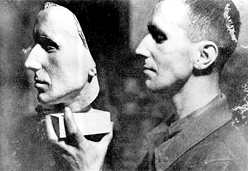Contemplating Hell

Migrating from Iran to Los Angeles, it is difficult to compare the city to hell. Bertolt Brecht probably had the same feeling when he escaped Nazi Germany and moved to LA. But there is something here, in Los Angeles, that made him write this poem. Something that might be partly true.
* Contemplating Hell
Contemplating Hell, as I once heard it,
My brother Shelley found it to be a place
Much like the city of London. I,
Who do not live in London, but in Los Angeles,
Find, contemplating Hell, that is
Must be even more like Los Angeles.
Also in Hell,
I do not doubt it, there exist these opulent gardens
With flowers as large as trees, wilting, of course,
Very quickly, if they are not watered with very expensive water. And fruit markets
With great leaps of fruit, which nonetheless
Possess neither scent nor taste. And endless trains of autos,
Lighter than their own shadows, swifter than
Foolish thoughts, shimmering vehicles, in which
Rosy people, coming from nowhere, go nowhere.
And houses, designed for happiness, standing empty,
Even when inhabited.
Even the houses in Hell are not all ugly.
But concern about being thrown into the street
Consumes the inhabitants of the villas no less
Than the inhabitants of the barracks.
Beautiful!
ReplyDeleteAnd this is a German writing about Los Angeles? I'll be charitable and attribute this to nostalgia and forced exile. And I detect a streak of stern, almost matronly socialist morality (see, money can't buy you happiness) that I hadn't seen in Brecht before.
ReplyDeleteConcern about being thrown into the streets consume all humankind, and in this sense the poem can be about Los Angeles, the metaphor for Generic City Anywhere, rather than Los Angeles, specific city hugging the California coastline.
I don't think it's all nostalgia. About the same years Brecht's fellow citizens Max Horkheimer and Theodor Adorno lived here in Los Angeles. they had their own criticisms about the Modern society the US represented at the time. Adorno and Horkheimer wrote the book Dialectic of Enlightenment here in LA in 1945, probably about the same time Brecht wrote this poem. In that book they described what, in their opinion, went wrong with the modern societies that resulted totalitarian regimes such as Hitler's or Stalin's. In their opinion it was not the German or Italian cultures that had problem but the whole system of thinking that was established after the Enlightenment. To them the US was not an oposition to totalitarian systems, but one of them with a totally different appearance.
ReplyDeleteAdorno and Horkheimer described how a seemingly democratic country like the US can be in the same path, even though it looks very different on the surface. They talked about how a certain type of worldview and a certain type of values are promoted in this society, and how criticism and free thought is silenced, not by secret police and Gestapo, but through the mechanisms that hide the totalitarian nature of the system, and make people believe in its supposedly-free nature. In a brilliant essay about Los Angeles Times astrology column Adorno writes about the ways people who live in a seemingly-democratic system learn how to abandon reasoning and accept the orders. In another essay on Hollywood system he writes about how the film industry shapes the culture in a way Joseph Goebbels could only dream about.
I see many of this people's criticisms still valid, or better to say eye-opening in a period that a huge percentage of the population waves the flag on their cars and thinks "United We Stand" is a great slogan. I personally don't see that much difference between the ideology beyond these words and the ideology of the Nazi Germany.
Its not necessarily about los angeles. Co.e on. He said his brother lives in london and thinks that is the hell. He mean to say that cities we live in are living hell.
ReplyDelete